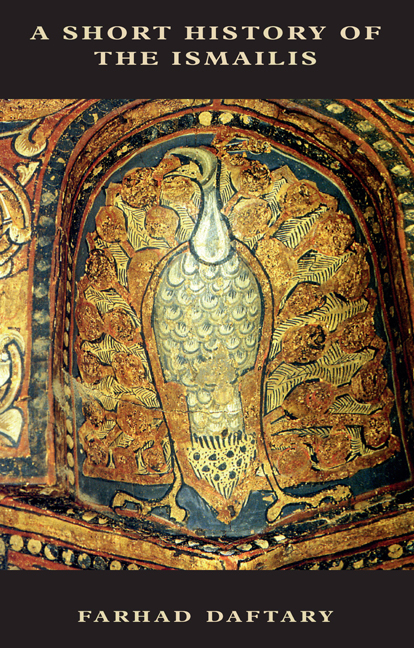Book contents
- Frontmatter
- Contents
- Preface
- Note on Transliteration, Dates and Abbreviations
- 1 Ismaili History and Historiography: Phases, Sources and Studies
- 2 Origins and Early History: Shī'īs, Ismailis and Qarmaṭīs
- 3 The Fatimid Age: Dawla and Da'wa
- 4 The Alamūt Period in Nizārī Ismaili History
- 5 Later Developments: Continuity and Modernisation
- Glossary
- Select Bibliography
- Index
3 - The Fatimid Age: Dawla and Da'wa
Published online by Cambridge University Press: 24 September 2020
- Frontmatter
- Contents
- Preface
- Note on Transliteration, Dates and Abbreviations
- 1 Ismaili History and Historiography: Phases, Sources and Studies
- 2 Origins and Early History: Shī'īs, Ismailis and Qarmaṭīs
- 3 The Fatimid Age: Dawla and Da'wa
- 4 The Alamūt Period in Nizārī Ismaili History
- 5 Later Developments: Continuity and Modernisation
- Glossary
- Select Bibliography
- Index
Summary
OVERVIEW
The Fatimid period is often represented as the golden age of Ismailism, an “interlude” in Ismaili history. The foundation of the Fatimid caliphate in 297/909 in North Africa doubtless marked the crowning success of the early Ismailis. The religio-political da'wa of the Ismā'īliyya had finally led to the establishment of a state or dawla headed by the Ismaili imam. This was no small achievement. The leader of a secret revolutionary movement, having tactfully evaded confrontation with the military forces of the Abbasids, had been installed to a new Shī'ī caliphate. The establishment of the Fatimid caliphate represented not only a great success for the Ismailis, who had come to possess for the first time an important state under the leadership of their imam, but for the entire Shī'a as well. Not since the time of ‘Alī had the Shī'a witnessed the succession of an ‘Alid from the ahi al-bayt to the actual leadership of an important Muslim state. Fatimid victory, therefore, heralded the fulfilment of a long-awaited Shī'ī ideal, frustrated and postponed for more than two centuries by numerous defeats and setbacks.
The Ismaili imam had always claimed to possess sole legitimate religious authority as the divinely appointed and infallible spiritual guide of the Muslims; with the Abbasids, like the Umayyads before them, never more than usurpers, depriving the rightful ‘Alid imams of their claims to leadership of the umma. With Fatimid victory in North Africa, however, events took a drastic turn in that remote corner of the Muslim world. By acquiring political power, and then transforming his nascent dawla into a flourishing and vast empire, the Ismaili imam presented his Shī'ī challenge to Abbasid hegemony and Sunni interpretations of Islam. Ismailism, too, now found its long-neglected place among the state-sponsored communities of interpretation in Islam. Henceforth, the Ismaili Fatimid caliph-imam could act as the spiritual spokesman of Shī'ī Islam in general, much like the Abbasid caliph had been the mouthpiece of Sunni Islam. And the situation of the Fatimids remained unchanged even after the coming to power, in the 320S/930S, of the Shī'ī Buyids (Būwayhids), not only because the Buyids themselves lacked ‘Alid ancestry and did not lay any claims to religious authority, but more importantly because they permitted the now helpless Abbasid caliph to stay in power nominally as the titular head of Sunni Islam.
- Type
- Chapter
- Information
- A Short History of the IsmailisTraditions of a Muslim Community, pp. 63 - 119Publisher: Edinburgh University PressPrint publication year: 2020



